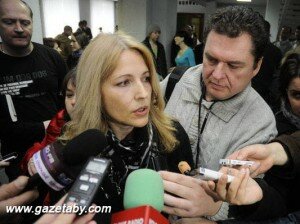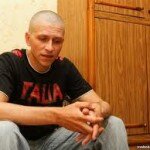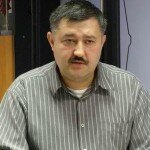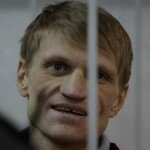
Belarusian human rights activist Ales Bialiatski was arrested two years ago.
Ales Bialiatski was taken into custody on August 4, 2011. He was found guilty of large-scale tax frauds some months later and sentenced to 4.5 years in a medium security correctional colony and confiscation of property. The ground for the prosecution was Bialiatski’s bank accounts in Lithuania and Poland. He spent the money on the accounts on human rights activities. Bialiatski serves his term in correctional colony No. 2 in Babruisk.
Natalia Pinchuk, the wife of the political prisoner, gave an interview to charter97.org two years after the arrest.
– Please tell us about the conditions in which Ales Bialiatski is being held
Unfortunately, the situation of Ales doesn’t change, it is rather difficult. I received a letter from him last week. He doesn’t describe his current confinement conditions, though Ales usually writes he is fine. But we know about the conditions here from former inmates of the colony and former political prisoners. I’d like to remind that presidential candidate Andrei Sannikov served sentence in this correctional colony.
Pressure on Ales hasn’t decreased. He was deprived of short and long-term visits this year. He cannot receive food parcels. We know from recently released inmates that he is under psychological pressure. Inmates are forbidden to talk to Ales under threats of refusal of parole or disciplinary sanctions. We know that some prisoners had preventive talks with prison officers. Former inmates were forbidden to spread information about conditions in the colony, but not all inmates are ready to obey the prison authorities, so we know this information.
As far as conditions permit, Ales writes the book he mentioned before. I say ‘as far as conditions permit’ on purpose – he works seven days a week and has little time to write. He carries on correspondence with the people involved in making the book.
– How did you life change after your husband’s arrest?
The day of August 4, 2011, entirely changed my life. I have to adapt to the new situation and new reality. I am all alone now. Ales is in prison. After his arrest, our son faced pressure. He was detained in the same month. I have to solve all problems that earlier were distributed among all members of the family.
– Human rights activists hold pickets across the world on the anniversary of Ales Bialiatski’s arrest. Is this support important?
Actions of support to the Belarusian political prisoners, including pickets on August 4, are very important. I know it from my own experience. The most awful time for me was the evening when Ales was arrested. After police searches, my son and I returned to the empty flat and remained alone facing the problem. There was complete silence – not a single call, not a single voice. The emptiness and silence were the most terrifying. It changed next day, so I know the price of support.
As for Ales, it’s obvious that he is in far more difficult conditions. Support is vital for him. It influences his life directly. Experience shows that solidarity of many people who support political prisoners is the struggle that will finally have effect.
– Does, in your opinion, today’s position of the European Union help release the political prisoners, in particular Ales Bialiatski?
-As far as the international factor is being concerned, I think it is a key one in the issue of Ales’s release. I’d like to remind that his sentence was illegal even in the context of the Belarusian law. Even witnesses for the prosecution said about the documents presented by a prosecutor that they couldn’t be found valid. There were violations of rights of the defence. The requests to check the documents presented by the prosecution and apply to organisations able to confirm Ales’s statements were ignored.
I hope the EU countries will continue to show solidarity with political prisoners and struggle for their release and rehabilitation.
– European Commissioner Štefan Füle said some days ago that he hoped to see Ales Bialiatski in Brussels soon. Do you share his optimism?
It’s pleasant to hear these optimistic forecasts, but I am sceptical about such statements. Talks on the release of political prisoners have been carried for more than two years, but the situation hasn’t changed. We can speak about Ales’s release only after it becomes reality.
charter97.org




